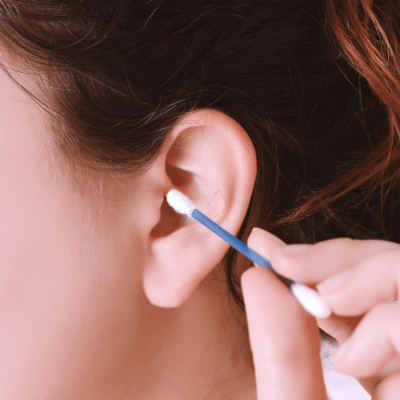To many of us, earwax is an enigma. There are many things we don’t understand about it. Many people see it as gross, while others love watching earwax extraction videos.
It comes in many colors and consistencies, while some people have much more of it than others. Many questions come to mind while pondering its meaning and existence in our lives. Almost everyone has a different opinion on how to keep ears clean.
So, what’s the skinny on earwax? What is the purpose of something leaking from our heads? Let’s discuss the basics.
What Is Earwax?
The cells inside your ear canal have to shed just like the rest of the skin cells on your body. Since that area is internal, it doesn’t receive the same treatment that the rest of your epidermis receives. But, much like other areas of the body, it is self-cleaning as much as possible.
According to Harvard Medical School, earwax, or cerumen, is a fatty cleanser created by sebaceous glands inside the ear canal that aids in the removal of toxins and keeping the canal clean. Chewing and speaking cause the canal to move, pushing the waxy substance and debris away from the body where it is supposed to, as it does for many people, dry up and just fall off.
Just Leave It Alone
Sometimes your ears itch, which can mean that you aren’t producing enough earwax. Sometimes your sebaceous glands can produce too much earwax or even dehydrate the wax, disrupting movement, causing the wax to collect and affecting hearing.
Did you know that using cotton swabs can make any problems you may suffer from worse? You could push the wax further in and cause serious impaction or perforate the eardrum. If you scrape the ear canal, infection is probable as the area is somewhat difficult to clean without the movement of the wax.
When faced with a problem, your best bet is always to leave it alone and even call your doctor if needed.
When Should I See A Doctor?
If you suffer from any of the following symptoms, a trip to your doctor may be necessary:
- Severe pain
- Hearing loss
- Increased drainage
- Ringing noises
Now, if you suffer from any of the following symptoms, call your doctor right away:
- Appearance of blood
- High fever
- Coughing
- Vertigo
- A foul odor coming from the affected canal
When a doctor gets that little flashlight tool to look into your ears, they are checking several things. One thing is the health of your eardrum. Another is to check the buildup of wax to see if your body is creating a healthy amount in the right consistency.
Your ears, and the way that they feel and work, can affect much more than your hearing and can be a symptom of a larger problem. Ear problems can lead to hearing loss that is permanent, and visiting your doctor can prevent further damage.
Contact us today! Call our Richmond office at (804) 525-4231 or our Midlothian office at (804) 378-7443.

